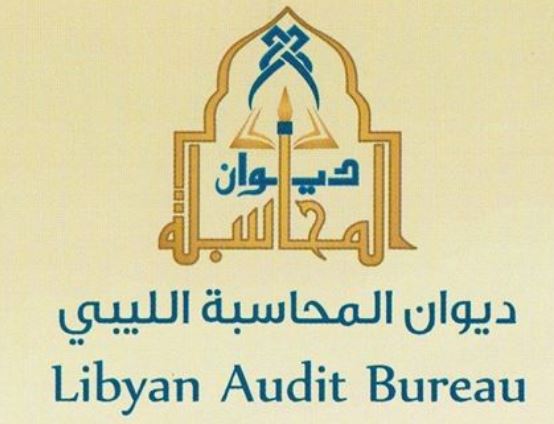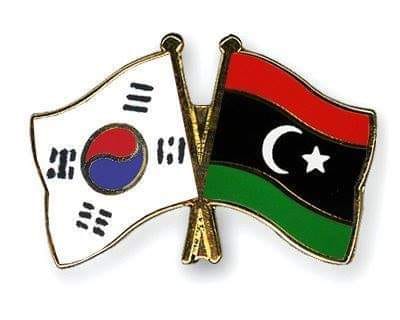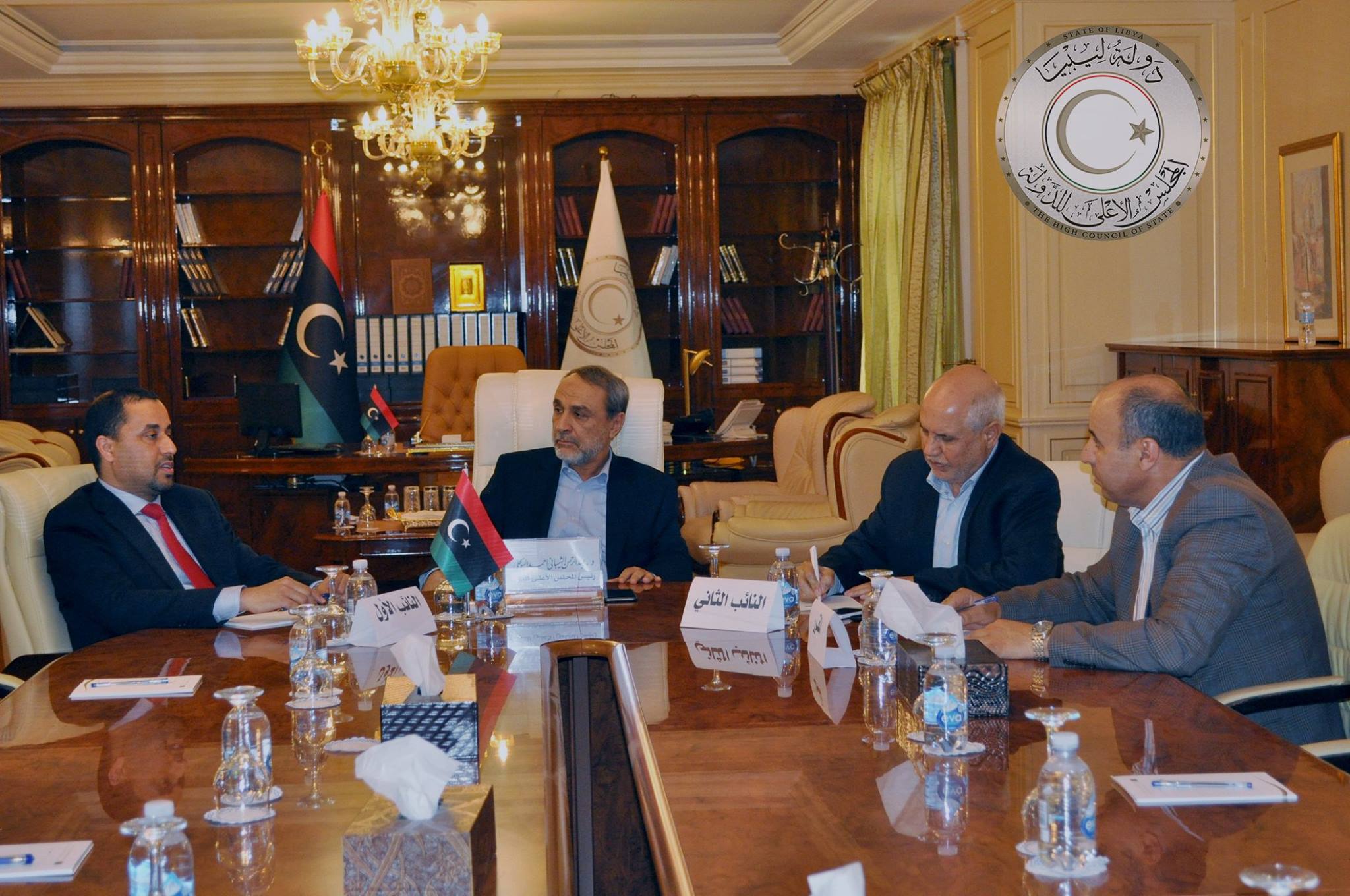By Sami Zaptia.
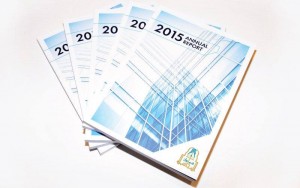
London, 22 April 2016:
The Tripoli-based Libyan Audit Bureau painted a very grim picture of the status of the Libyan . . .[restrict]economy in its 565 page 2015 Annual Report released last week.
It reported that Libya’s state revenues from 2012 to 2015 totalled LD 158 bn but the Central Bank of Libya (CBL) had made available a total of LD 200 bn, leaving a LD 42 bn deficit which the CBL made up from its reserves. In reality it says only LD 194 were spent leaving LD 6 bn sitting in state accounts for this period.
In 2015 alone, the Audit Bureau says, the state’s total revenues only totalled LD 11 bn wheras its spending was LD 36 bn leaving a deficit of LD 25 bn.
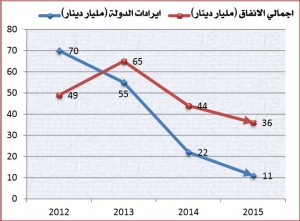
This large deficit was covered through LD 19 bn of CBL reserves and LD 5 bn from unused money sitting in state accounts. The Audit Bureau says Libya still suffered this huge deficit in 2015 despite a large reduction of 18% in state spending in 2014
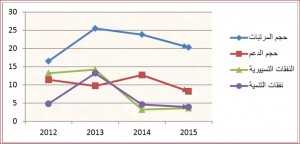
The Audit Bureau figures show that the Libyan authorities have made large reductions in the various spending sections to reflect the fall in the state’s revenues.
The largest state spending in the budget is state-sector salaries (blue). These had started at just over LD 15 bn in 2012 and quickly shot up to around LD 25 in 2013. However, the authorities have been able to force these down to around LD 24 bn in 2014 and down to LD 20 bn in 2015.
Expenditure on subsidies (red) zig zagged since 2012 peaking in 2014 before falling under LD 10 bn in 2015. Both the running and general expenses (green) of state institutions and development and projects (purple) spending sections of the budget have been squeezed to under LD 5bn in 2015 from peaks of over LD 10 bn in 2012.
Nevertheless, the salaries and subsidies sections of the Libyan state budget still represented 66 percent of spending between 2012 and 2015 while development and projects only received 13 percent of budgets during this period. Public debt represents 3 percent of total spending.
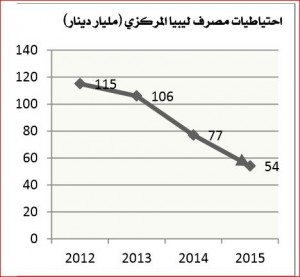
The Central Bank of Libya US dollar reserves that have been financing Libya’s budget deficits since 2012 have been depleting at an alarming pace the Audit Bureau says. From LD equivalent of 115 bn in 2012 they decreased to LD 106 bn in 2013, to LD 77in 2014 and to LD equivalent of 54 bn at the end of 2015.
This equates to a decrease of 54 percent of CBL foreign currency reserves since 2012 a rate of depletion that will lead to the exhaustion of the state’s reserves in a short period if it is to continue at the same rate, the Audit Bureau warned.
The Audit Bureau pointed out that spending at these rates by the Libyan state require large amounts of foreign currency to cover the cost of the importation of goods and products. Libya is a net importer of almost everything except for crude hydrocarbons.
The report says that the state will soon no longer be able to meet the demand for hard currency to meet these imports if hydrocarbon production/exports remain at present low levels and international crude oil prices at present low levels.
This, it adds, is especially so since Libya has no diversified economy and no alternative revenues to hydrocarbons.
The Audit Bureau further said that if state expenditure, and the salaries and subsidies sections especially, are not reduced in view of reduced revenues, the state economy will continue to be handicapped preventing any reforms in public policy to enable the balancing of the economy and prevention of economic disasters.
| 2013 | 2014 | 2015 | |
| CBL deposits | 106 | 77 | 54 |
| Reserves | 17 | 17 | 17 |
| LIA deposits in CBL | 23 | 23 | 23 |
| Total | 146 | 117 | 94 |
CBL reserves at 31/12/2015 – source Audit Bureau 2015 Annual report
The Audit Bureau reported that the CBL reserves are made up of CBL deposits, set-aside reserves and LIA deposits at the Central bank. It noted that most of the investments of the Libyan Investment Authority (LIA) are still frozen by virtue of the UNSC resolution.
It warned that if the CBL is unable to make use of its reserves, it will be forced to devalue the Libyan dinar which will lead to a fall in the living standards of a wide section of the Libyan population.
Lost oil revenues
Lost oil revenues between August 2013 and 31 December 2015 amounted to about US$ 70 bn (LD 98bn) the Audit Bureau reported.
Oil production fell to 146 million barrels per year, down from 531 million barrels per year which represents a decrease of 73 percent. The loss in production of 385 million barrels represents a loss of US$20 bn to the Libyan state.
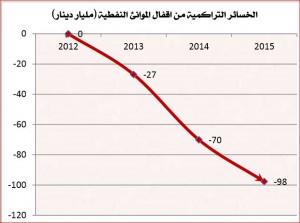
The Audit Bureau says that Libya’s oil production and export has declined dangerously during the three-year period 2012-2015 leading to the most acute economic crises faced by the state as production levels fell from 530 million barrels in 2012 down to 146 million barrels in 2015.
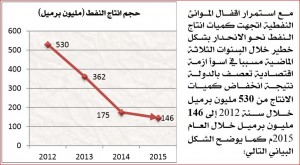
The Audit Bureau reported that thanks to the enforcement of the National ID Number as a prerequisite to the payment of any state-sector salaries, the state has succeeded in reducing the number of duplicate state employees withdrawing multiple salaries from over 2.13 million in 2013, to 1.96 in 2014, to 1.68 in 2015 and expects this figure to fall to 1.49 in 2016. This it says has reduced the state salary bill from LD 25.5 bn in 2013 to LD 18 bn in 2016.
In 2015 the Audit Bureau reported that there were over 398,000 duplicate employees which were reduced to 235,000 in March 2016 and down to just 125,000 at the time of the publication of the report. [/restrict]




